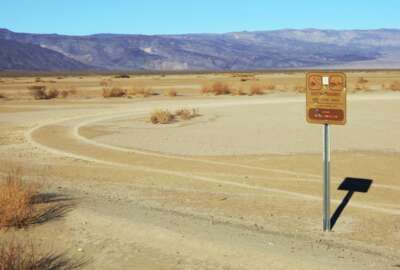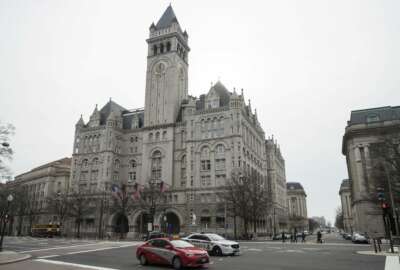
Interior faces questions on reorg, NPS backlog during budget hearing
The Interior Department's proposed 2020 budget would devote $28 million to reorganization DOI its offices into 12 regions based on watersheds, versus eight bure...
A theme emerged Tuesday during a hearing of the House Committee on Appropriations Subcommittee on Interior, Environment and Related Agencies. Lawmakers described a lack of response from Interior Department on several funding issues.
DOI faced the committee to present its $12.5 billion discretionary funding request for fiscal 2020, a $1.5 billion or 10.9 percent decrease from the FY 2019 estimated allocation of $14 billion, according to the president’s budget. Some of the cuts would come from park and wildlife agency operations, U.S. Geological Survey science programs, and areas the administration called “unnecessary or duplicative” such as land acquisition funds, grant and loan programs and the National Wildlife Refuge Fund.
The budget would devote $28 million to a department reorganization. DOI is looking to reorganize its offices into 12 regions based on watersheds, versus the current eight bureaus and 49 regional structures nationwide. Although over the summer the department said it had no plans to move personnel as part of the initial implementation, the budget released earlier this month said the reorganization would relocate employees west, including headquarters staff.
Rep. Mark Amodei (R-Nev.) told Scott Cameron, principal deputy assistant secretary in the DOI’s Office of the Assistant Secretary for Policy, Management and Budget, that it had been hard for Congress to get updates on the reorganization plans, which were introduced by former Secretary of the Interior Ryan Zinke in early 2018. Cameron said the department only received its fiscal 2019 appropriations slightly more than a month ago, and the requested 2020 funding would focus on standing up the 12 regions.
He appeared before the committee in place of Acting Secretary David Bernhardt, who is scheduled to appear before the Senate Committee on Energy & Natural Resources for a confirmation hearing Thursday.
Related Stories

Lawmakers ask for GAO review of Interior’s decisions during government shutdown
Cameron told the committee that the 12 unified regions did not include the bureaus that engage with Indian Country because they did not wish to participate in the effort. But Committee Chairwoman Betty McCollum (D-Minn.) argued that Indian Country chose not participate because they were only consulted after the regions were drawn.
“One of the things that we were hoping is that partners would be consulted and that’s why I think this discussion, as you can see, needs to be with a secretary later on because those are letters and agreements and emails that have been shared with staff between Mr. Bernhardt, our staff and myself and others,” McCollum said.
National Park Service funds use questioned
Aside from the reorganization, McCollum highlighted another area in which she said DOI has been reluctant to share information with Congress.
The subcommittee is the only one under Appropriations which lacks reprogramming guidelines to give agencies flexibility to shift allocations due to unforeseen circumstances, and for several years members have tried to change that.
“Throughout this process we have asked the department for drafting input so we get it right for the department. And to be frank, the department has … resisted this effort and been uncooperative,” she said. “Why has the department refused to provide the technical assistance we’ve requested so we get this reprogramming text in the bill right so it works for everyone?”
She also asked if DOI followed the appropriations committee’s reprogramming guidelines during the shutdown. Cameron said he did not know but that, to the best of his knowledge, DOI did, a response which the chairwoman found “unacceptable.”
“I would suggest that we, from our perception at least, that we have abided by the committee’s reprogramming guidelines and … the relation has worked so if that’s in fact the case then we don’t see obvious value for having the reprogramming language in statute,” he said. “We do have some complications particularly in our National Park Service. They seem to need to have the flexibility to move money around from line item to line item, which makes drafting any sort of statutory requirement challenging.”
DOI once again received ire from committee members for its actions during the partial government shutdown at the start of the year when NPS not only used Federal Lands Recreation Enhancement Act fees to cover daily operations at national parks during the event, but also kept the Old Post Office Tower at the Trump Hotel in Washington, D.C. open. The committee has asked the Government Accountability Office to investigate the fees decision.
BLM staffing vacancies persist
Other highlights of DOI’s budget request include a $197 million decrease in funds for the NPS, U.S. Fish and Wildlife Service and Bureau of Land Management’s deferred maintenance backlogs, as well as $300 million for wildfire suppression funds. The White House said the latter was to increase active forest management and prevent wildfires, eliminating the need for “fire borrowing” at the U.S. Forest Service.
Amodei also expressed concern about chronic staff vacancies in Bureau of Land Management offices around the country — about one third of the positions are unfilled. He said this lack of staffing conflicted with the administration’s claim that it did not wish to lose federal lands.
“At some point in time, I think the embarrassment factor has to get in to say ‘I’m not entitled to like what your agency people do in my state but I am entitled to think that they’re going to be appropriately staffed so that whatever discretion they use is done,” he said to Cameron. “And I had this conversation at the beginning of this administration and I can tell you — here’s my challenge to you — basically, it’s been crickets.”
Cameron said DOI’s budget aims to protect or increase spending for BLM agencies, resulting in cuts to grants and other programs. He said the FY 2020 request represents a $164 million increase from the FY 2019 request but acknowledged BLM continues to face challenges.
Copyright © 2024 Federal News Network. All rights reserved. This website is not intended for users located within the European Economic Area.
Amelia Brust is a digital editor at Federal News Network.
Follow @abrustWFED




